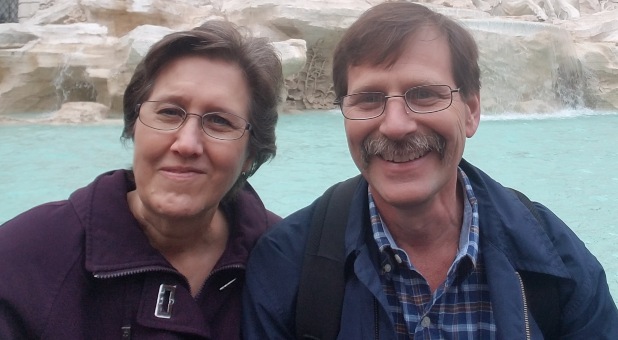Tracy Kamprath Tells How Her Journey of Healing Was a ‘Blessed’ Journey
When Tracy Kamprath looks in a mirror, she often recalls the time when God blessed her. Granted, when a doctor diagnosed her with a brain tumor that would leave part of her face paralyzed, it did not feel like a blessing.
Although having trouble with her hearing, she kept putting off going to the doctor. When she finally consulted one, he discovered tumors. Not just the one in her ear, but after several scans and follow-up visits, he found a tumor in her brain as well.
An initial visit with a surgeon revealed the estimated cost for surgery on the Chappell Hills, Texas, woman: more than $100,000. In fact, he told her the bills for such an operation commonly reached $250,000.
While that was not unusual for that kind of surgery, Tracy and her husband, Jeffrey, had no health insurance—by choice. Instead, they are members of Samaritan Ministries International, a health care sharing ministry in which members help pay the medical costs of other members.
The Kampraths joined SMI when both taught at a private Christian school. Though unable to afford health insurance, with two teenage boys and a younger daughter, “We felt like we had to have something,” especially with the children involved in sports and the potential for injuries.
As a result, the couple looked into the three largest health care sharing ministries. However, even after feeling confident enough to join SMI, the Kampraths still weren’t completely sold on the ministry.
“Maybe I’m stubborn and have to experience things,” Tracy said.
Experience overcame her stubbornness. Before the brain tumor, the family had submitted several other medical needs. SMI “worked beautifully,” which convinced Tracy.
Even with their past positive experiences with the ministry, the financial prospect unsettled them—especially since they were only members of the basic ministry which had a limit of $100,000 per medical condition at the time. They would have to find resources for any additional costs.
Tracy panicked. “What have we done? We don’t have insurance!” She sat in the car with Jeffrey after her appointment and cried.
“We can’t face this—physically or financially,” Tracy told her husband.
Jeffrey comforted her, reminding her of times in their lives and in Scripture when “trusting in God” had looked foolish in the world’s eyes, yet things had worked out. It looks foolish to 21st-century Americans when someone does not have health insurance and instead relies on God and the body of Christ to help them bear that burden. The Kampraths were going to trust that people they had never met were going to send them money to help them pay their steep medical bills.
In the eyes of the early church, it was—and still should be—a natural expectation that we help each other in times of need. After all, the apostle Paul wrote, “If one member [of the body of Christ] suffers, all suffer together; if one member is honored, all rejoice together” (1 Cor. 12:26, ESV).
“That was the thing that just kind of thrilled me, to see God taking the thing that the world was saying was foolish and then showing His glory,” Tracy said.
Members are expected to be praying for those with whom they have shared. The Kampraths made that point to their doctor. “We told him we had thousands of people praying for him,” Tracy said.
The answers to those prayers came. Tracy walked out of the hospital six days after her operation instead of the predicted six weeks.
“I went home on April Fool’s Day, which I thought was God’s joke on the doctor,” Tracy said.
And the final cost of the incident, thanks to discount negotiations, ended up at around $55,000, far below the initial $250,000 estimate. The Kampraths received other members’ shares, along with cards of encouragement.
“It’s made me very aware of the gift of life that God’s given me and taught me that I need to not go through life blindly,” she said. “I have a little bit of facial paralysis left, but not much. To somebody that’s new to meeting me, they can’t tell, but to my family, they can see a little bit. To me, the paralysis is a reminder. When I look in the mirror, I think, That’s OK. That’s a reminder of what God did for me. Not a day goes by that I don’t think I’m so fortunate and blessed.”
The blessings, she said, enabled Tracy to draw close to God and to “be able to see Him work through His body in so many different ways.”
“I thank God that we found SMI and that He led us there,” Tracy said. “I’m in awe of how He works through … the body of Christ and that in this day and age something so simple can have such a profound impact on people’s lives.”
Tracy’s and Jeffrey’s story is included in Sharing the Burden: The Samaritan Ministries Story. {eoa}
Mike Miller is senior communications specialist for Samaritan Ministries International.




























































